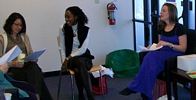In order to imagine how a tinnitus sufferer feels, imagine the sounds of siren or the screeching sound of vehicles or crackling sounds of wood fire constantly ringing in the ears. This can be a tormenting condition that makes life difficult.
In fact, these sounds get more intense at night time when a person is supposed to get some rest and sleep. As a result, the tinnitus sufferer becomes stressed and harassed because he finds it hard to complete a full night's recovery.
The latest findings in medical researches about tinnitus disclose that vibrations reach the movable bones and hair cells in the cochlea. However, the tinnitus sufferer whose cochlear hair cells have been damaged will be affected, in such a way that the hair cells are continuously sending bursts of electrical impulses to the brain.
These electrical impulses are received by the brain, which in turn translates the vibrations as non-stop buzzing, whizzing, crackling or ringing in the ears.
In as much as this condition is quite distressful, the following are the important steps that an individual suffering from tinnitus should take:
1. Stay Away from Noise or Loud Blaring Noises
Stop aggravating your tinnitus condition by disengaging yourself from the use of your MP3, iPods, Walkmans and other portable music devices which you constantly attach to your hearing system. You are only distressing the hair cells even more or harming more hair cells that will only intensify the ringing in the ears.
2. Stay Away from Aspirins, Antacids and Strong Cough Medicines If You've Had too Many of Them
If you have been constantly pumping yourself with antacids and aspirin, discontinue your use of these medicines and seek other forms of relief from your doctor. Take note if the ringing in the ears has lessened in terms of intensity to indicate improvement. In case you're not aware, tinnitus is one of the side-effects of over-medication.
3. Avoid Taking in Chemical Stimulants
These chemical stimulants can be found even in foods like chocolates or in beverages like alcohols, coffee, tea and soft drinks or other substances like cigarettes, tobacco or drugs like marijuana or cocaine.
Since these stimulants will give you a "kick", the intensity of the ringing in the ears will heighten as the hair cells in your ears will become more active.
4. Engage in Routine Exercises
Ringing in the ears is also caused by poor blood circulation due to hypertension, hypotension or hardening of the arterial walls. Keep a constant check of your blood pressure whether it goes up or drops down, since both conditions will lead to pressure points that can cause tinnitus.



